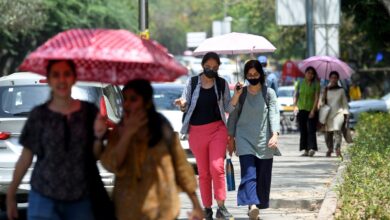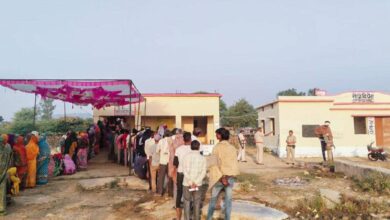Ludhiana | Kisan mela jam-packed with farmers at KVK Rauni

Encouraging farmers to attend kisan melas, Harpal Singh Cheema, cabinet miner, finance, planning and excise and taxation, Government of Punjab, while inaugurating the kisan mela at Krishi Vigyan Kendra Rauni, Patiala, on Sunday, said, “The kisan melas organised Punjab Agricultural University (PAU) are a wealth of knowledge, therefore, every farmer must attend these melas and bring along at least one new farmer to experience and adopt the technologies recommended the university,” remarked Applauding the heavy rush of farmers witnessed at the mela, Cheema urged them to trust the krishi vigyan kendras working tirelessly towards promoting new varieties, techniques and machinery for the larger benefit of the agricultural fraternity.‘Punjabi farmers will spearhead the change towards sustainable agriculture’“The traditional rice-wheat cropping pattern needs to be replaced urgently with diversified crops, specifically aimed at conserving soil and water, in view of the rapidly declining watertable and soil contamination in the state,” he said, adding that the people of Punjab are exemplary in that they welcome change as seen during the past elections and now Punjab farmers would spearhead the change towards sustainable agriculture.Guest of honour Balbir Singh, MLA, Patiala rural, called for taking each and every farming model recommended PAU to the fields of farmers. “Prosperous farmers are the backbone of prosperous Punjab,” Singh said, while also emphasising the need for a library in every village. He urged farmers to subscribe to farm publications brought out the university, with special reference to the monthly Changi Kheti. The MLA batted for a pledge to shun stubble burning in the forthcoming paddy harvest. Focus on climate-resilient agriculture PAU vice-chancellor Satbir Singh Gosal, while recalling the establishment of the KVK Rauni in 1995 and organising kisan melas ever since, drew attention towards climate-resilient agriculture in view of the ongoing agricultural problems as a result of depleting groundwater, degrading soil health and stubble burning. “Constant burning of stubble year- after -year has deleted the nutrients of soil,” Gosal said. He also warned against extensive use of urea in the fields which makes the crops more prone to disease and pests, along with a greater risk now that the urea has entered into the drinking water of the state. Gosal pointed towards the concept of kitchen gardening all farmers which would not only curtail household expenditure, but also improve health of the entire family. “We are blessed to have the best soil in the world and it is our duty to replenish it,” Gosal said, while also advising farmers to exercise care while marketing basmati export where excess moure and grain breakage renders the entire consignment as rejected countries.Highlighting the research achievements of PAU, additional director of research PPS Pannu shared that the wheat varieties PBW 826, PBW 833 and PBW 872 had received the nod for release at the national-level. Urging farmers to adopt university recommended varieties and technologies, he said conserving natural resources for future generations making their apt use was the need of the hour. The university has evolved more than 900 varieties so far, of which 225 have been released at the national-level, he added.Director of extension education Ashok Kumar thanked the guest of honour, Sakshi Sawhney, IAS, deputy commissioner, Patiala, for paying personal attention to all farmers’ schemes and visiting the KVK to facilitate operations.He emphasised on implementing the theme of mela— Kisani jawani te paun paani bachaiye, aao rangla Punjab banaiye— adopting environment-friendly agriculture practises, curtailing frivolous expenditure and paying attention to health. He advised farmers to connect with PAU through ICT tools such as WhatsApp, Facebook, YouTube and farm literature.On the occasion, MS Kang, former PAU vice-chancellor, Allah Rang, former PAU professor of plant breeding and genetics were bestowed with the award of honour for their contribution to agriculture and allied fields. A long queue of farmers, farm women and youths purchasing improved seed, vegetable kits, planting material, bio-fertilizers and farm publications was witnessed at the mela. Live demonstrations (varieties and farm machinery) and technical sessions were the major highlights of the mela.





